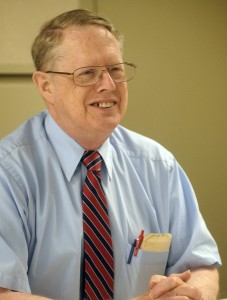Man behind the law: Bruce Timmons
When it comes to the state’s judiciary and laws against crime, perhaps no one alive has had a greater role in drafting them than Bruce Timmons.
Timmons is not a member of the Legislature. But he has been a key staff member for the House Judiciary Committee going all the way back to an internship in 1967, when he merely helped draft the legislation creating Michigan’s district courts.
The longtime top House Republican staff member to the committee, Timmons, 69, provides rare institutional memory for the Legislature, having served under 12 different speakers and six governors.
It was a class at Kalamazoo College that triggered his interest in politics. His professor missed a class because he was involved in a competition between Kalamazoo and Portage Township to see which community could file petitions sooner in an annexation fight that ultimately led to Portage incorporating as a city to ward off annexation by Kalamazoo.
Timmons, a Detroit native, found the professor’s explanation of the situation fascinating, and when he saw an opening for a legislative internship while at the University of Michigan, he applied and was one of eight hired. He’s never left.
 “I’ve just found it a fascinating place to be,” Timmons said. “I would have to say in all the time I’ve been down there, I’ve never had the chance to get bored. There’s not many things you’d do where you’d be able to make that claim.”
“I’ve just found it a fascinating place to be,” Timmons said. “I would have to say in all the time I’ve been down there, I’ve never had the chance to get bored. There’s not many things you’d do where you’d be able to make that claim.”
There is no typical day for Timmons in Lansing. His daily duties have depended on whether he was working for the party in control of the House or in the minority. Either way, it usually involves fielding calls and emails about pending and future legislation, analyzing it to make sure it does what legislators want it to do and working groups interested in the legislation. During times when he's dealing with highly technical bills that can run into the hundreds of pages, Timmons holes up in an office well-stocked with Diet Coke.
Timmons has a legion of admirers spanning his years of service. They describe him similarly: a master of legislative history, even-handed, easy to work with, a gentleman.
“Those four years were just so exceptional in terms of having the most competent and talented staff person that made the work of the committee so much easier,” said former state Rep. Robert Traxler, a Bay City Democrat who was chairman of the Judiciary Committee from 1969-74 and later served in the U.S. House. “Bruce is a bright, gifted, very talented individual, who has the highest ethical standards and who served the members of the committee without regard to their party affiliation.”
Indeed, while Timmons is a Republican, Democratic chairs of the Judiciary Committee retained him as the top staffer through the 1970s. Democrats retook control of the House in 1968, but Traxler had gotten to know Timmons from their work on the committee.
Besides the district court system, Timmons also was involved in legislation making traffic offenses a civil infraction (they used to be misdemeanors), setting up the Judicial Tenure Commission, the Crime Victims Rights Act, overhauling sentencing guidelines, stopping a controversial and ultimately nullified redistricting move by legislative Democrats in 1983, tort reform and rewriting the Probate Code. He also made the suggestion during the 1993-94 term when the House was split at 55-55 to have control alternate monthly between the parties on the floor and on committees.
Timmons recalls fondly working on the district court overhaul with the Judiciary chairman at the time, Rep. Donald Holbrook Jr.
“I couldn’t have had a better mentor to start with,” he said. “It certainly showed me the difference one legislator could make.”
Timmons’ run as the top Judiciary staffer ended when former Rep. Perry Bullard, an Ann Arbor Democrat, became chair of the committee in 1981. Timmons left to work for the Legislative Service Bureau. Timmons returned to the House to work for the policy staff in 1983.
Since returning, he has worked as the top Republican on Judiciary. The current chair, Rep. John Walsh (R-Livonia), said Timmons is a huge asset to him, the committee and the Legislature.
“The biggest help he provides for me as chair our caucus and the whole House in general is the history he has,” he said. “In my opinion, he’s very balanced. He will bring the good, the bad and the ugly and help us develop a policy bill that makes sense.”
Bill Flory, now legislative counsel for the Michigan Association for Justice, but a former House Democratic staffer to the Judiciary Committee, said Timmons was fair and knowledgeable.
“He’d give you the whole story. He wouldn’t short you on it,” Flory said.
Over the years, Timmons had the opportunity to work for governors, the Senate or private firms, but he said he liked the personable nature of the House, where staff can usually call members by their first names. And he could continue to serve the public.
Timmons, who holds a law degree from the University of Michigan, said he has no idea how much longer he will continue in the role and notes he and his wife, Jan, have a 16-year-old son (Charles) who will soon go to college.
Traxler was asked if, 37 years after leaving the House, he was surprised Timmons remained in the same role.
“I could not visualize Bruce doing anything else,” he said. “He’s so committed to the public and to the Legislature and the committee.”
This story was produced in a collaboration between Bridge Magazine and the Gongwer News Service.
See what new members are saying about why they donated to Bridge Michigan:
- “In order for this information to be accurate and unbiased it must be underwritten by its readers, not by special interests.” - Larry S.
- “Not many other media sources report on the topics Bridge does.” - Susan B.
- “Your journalism is outstanding and rare these days.” - Mark S.
If you want to ensure the future of nonpartisan, nonprofit Michigan journalism, please become a member today. You, too, will be asked why you donated and maybe we'll feature your quote next time!


